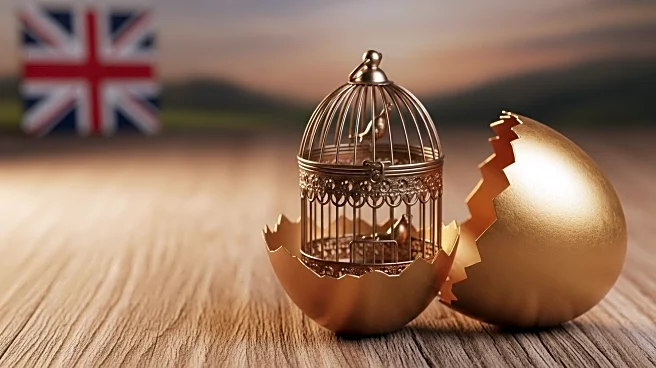What is the story about?
What's Happening?
The British Egg Industry Council has raised concerns over the increasing import of eggs from Ukraine and Poland, which have become the UK's largest suppliers. These imports are primarily from caged hens, a practice banned in the UK since 2012. The shift in suppliers has occurred as the Netherlands' share of UK egg imports has declined. In 2025, Ukraine and Poland together accounted for over 15 million kilograms of eggs supplied to the UK. The imports have increased from about 3,500 consignments in 2023 to over 10,000 in 2024, with smaller shipments replacing larger ones. Mark Williams, chair of the British Egg Industry Council, argues that UK farmers are at a disadvantage as they adhere to higher welfare standards while imports bypass these regulations. The UK and EU have suspended tariffs on Ukrainian goods to support its economy post-Russian invasion, allowing eggs to be exported without extra costs.
Why It's Important?
The import of eggs from countries with lower welfare standards poses a challenge to UK farmers who have invested in higher welfare practices. This situation undermines the efforts of British retailers who have pledged to go cage-free by 2025. The imports are more likely to affect the food service and processing sectors, which are price-sensitive and may opt for cheaper foreign eggs. The UK produces about 88% of its eggs domestically, with imports making up the remaining 12%. The tariff suspension is intended to support Ukraine during wartime, but it raises ethical concerns about the impact on local farmers and the integrity of welfare standards in the UK egg industry.
What's Next?
Ukraine has requested the UK to maintain tariff suspensions until 2029, but eggs and poultry are classified as sensitive products, receiving only a two-year extension. The UK government is engaging with the egg industry to draft new regulations to ensure fair competition for producers. The government has pledged to protect farmers in trade deals and is working on making the supply chain fairer. The ongoing discussions and regulatory adjustments will determine the future landscape of egg imports and domestic production standards.
Beyond the Headlines
The situation highlights the ethical dilemma of balancing humanitarian aid with domestic industry protection. The tariff suspension supports Ukraine's economy but challenges the UK's commitment to animal welfare standards. This development could lead to long-term shifts in trade policies and consumer preferences, potentially influencing global egg production practices. The debate underscores the complexity of international trade agreements and their impact on local industries.















